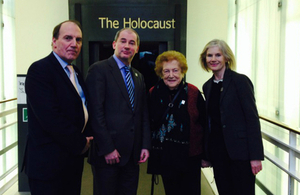Remembering the testimony of Holocaust survivors
Stephen Williams speaks of the importance of remembering, ahead of Holocaust Memorial Day which is held worldwide on 27 January.

Stephen Williams with Sabina Miller
Ahead of Holocaust Memorial Day 2015, Communities Minister Stephen Williams stressed the importance of remembering those that resisted, those that escaped and those that survived the Holocaust to share their important testimony.
He was speaking ahead of a visit – together with Sabina Miller a child survivor of the Holocaust – to the Imperial War Museum’s dedicated exhibition to the horrors of Nazi occupied Europe.
Holocaust Memorial Day is a worldwide event held each year on the 27 January, the day Auschwitz-Birkenau the largest of the Nazi death camps was liberated. The day commemorates all the communities that suffered as a result of the Holocaust and in subsequent genocides in Cambodia, Bosnia, Rwanda and Darfur.
It provides a focus – through national and local events – for people to think about the continuing repercussions of the Holocaust and more recent genocides. It is also a focus for education about the dangers of antisemitism, racism and discrimination in all its forms.
This year is significant as it marks the 70th anniversary of the liberation of Auschwitz-Birkenau. On Tuesday, at a specially convened debate in the House of Commons, Stephen Williams said:
If we do not encourage everyone to remember, it will be no wonder if many start to forget. Holocaust education reminds us that behind the statistics were real people, who lived, loved and laughed, and who might have gone on to be mothers, fathers or even Nobel laureates.
That is why we continue to support the Holocaust Memorial Day Trust. This year, the trust has commissioned the artist Anish Kapoor to design candles that have been placed in 70 locations around the country. My colleague the Secretary of State will take one of those candles to Auschwitz-Birkenau as part of the 70th anniversary commemorations next week.
It is our duty to remember the past, and never to be silent about prejudice, bigotry and hatred in our own time. We need more than ever to ensure that never again means never again.
Last year over 2,400 activities took place across the UK. This year to highlight the range and diversity of all the activities taking place, 70 towns and cities across the country will host one of 70 specially designed candles commissioned to mark the anniversary.
Many of these towns and locations have been chosen because of their historical significance, such as Lowestoft Railway Station where 200 Kindertransport refugees arrived in December 1938.
Biography
Sabina Miller was born in Warsaw in 1922 into a family of 4 children. Her childhood was a happy one until in her teens her and her family were moved into the Warsaw ghetto. Here, Sabina believes her parents died of typhus.
Her older brother paid a Polish man to smuggle her and her younger brother out of the ghetto to live with her aunt in the countryside but whilst working on a local farm with 29 other Jewish girls lorries arrived to take the girls away. Terrified, Sabina and her friend Ruzka made the decision to run away.
Sabina managed to survive the war assuming various identities and hiding in the Polish countryside before being offered the chance to assume a farmer’s daughter’s identity and work as a forced labour in Germany.
Today Sabina is a great grandmother and cherishes her family. Her only childhood possession is the red cardigan given to her by her mother, which she wore during her time as a fugitive. It is the only link to her family.
Sabina said:
When the war ended I thought I was the last Jew in Europe.
Further information
2015 marks the 70th anniversary of the liberation of Auschwitz-Birkenau. It also marks the 20th anniversary of the genocide in Srebrenica, Bosnia.
For more information on the 70 candles for 70 years project and the range of activities taking place this year see http://hmd.org.uk
Read more about Sabina’s story
Through the use of personal testimony, photographs, diaries, newspapers, artefacts, posters and film, the Holocaust Exhibition at the Imperial War Museum traces the Nazi persecution and murder of Europe’s Jews from 1933 to 1945.
The Department for Communities and Local Government funds the Holocaust Memorial Day Trust to raise awareness of the Holocaust and subsequent genocides. They support local organisations to hold their own activities for Holocaust Memorial Day and help learn the lessons of the past to create a safer future.
The government has contributed £2.1 million to the preservation of the Auschwitz-Birkenau concentration camp to help ensure the lessons of Auschwitz live on for generations to come. The contribution is primarily funded by the Department for Communities and Local Government and the Foreign and Commonwealth Office.
Office address and general enquiries
2 Marsham Street
London
SW1P 4DF
Email [email protected]
General enquiries: please use this number if you are a member of the public 030 3444 0000
If your enquiry is related to COVID-19 please check our guidance page first before you contact us - https://www.gov.uk/guidance/coronavirus-covid-19-guidance-for-local-government.
If you still need to contact us please use the contact form above to get in touch, because of coronavirus (COVID-19). If you send it by post it will not receive a reply within normal timescale.
Media enquiries
Email [email protected]
Please use this number if you are a journalist wishing to speak to Press Office 0303 444 1209